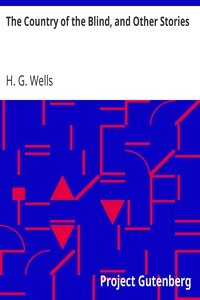The Country of the Blind, and Other Stories, H. G. Wells [top 10 books of all time TXT] 📗

- Author: H. G. Wells
Book online «The Country of the Blind, and Other Stories, H. G. Wells [top 10 books of all time TXT] 📗». Author H. G. Wells
"Not a bit," Haddon answered over his shoulder. "We shall chloroform you. Your heart's as sound as a bell." And as he spoke, I had a whiff of the pungent sweetness of the anaesthetic.
They stretched me out, with a convenient exposure of my side, and, almost before I realised what was happening, the chloroform was being administered. It stings the nostrils, and there is a suffocating sensation at first. I knew I should die—that this was the end of consciousness for me. And suddenly I felt that I was not prepared for death: I had a vague sense of a duty overlooked—I knew not what. What was it I had not done? I could think of nothing more to do, nothing desirable left in life; and yet I had the strangest disinclination to death. And the physical sensation was painfully oppressive. Of course the doctors did not know they were going to kill me. Possibly I struggled. Then I fell motionless, and a great silence, a monstrous silence, and an impenetrable blackness came upon me.
There must have been an interval of absolute unconsciousness, seconds or minutes. Then with a chilly, unemotional clearness, I perceived that I was not yet dead. I was still in my body; but all the multitudinous sensations that come sweeping from it to make up the background of consciousness had gone, leaving me free of it all. No, not free of it all; for as yet something still held me to the poor stark flesh upon the bed—held me, yet not so closely that I did not feel myself external to it, independent of it, straining away from it. I do not think I saw, I do not think I heard; but I perceived all that was going on, and it was as if I both heard and saw. Haddon was bending over me, Mowbray behind me; the scalpel—it was a large scalpel—was cutting my flesh at the side under the flying ribs. It was interesting to see myself cut like cheese, without a pang, without even a qualm. The interest was much of a quality with that one might feel in a game of chess between strangers. Haddon's face was firm and his hand steady; but I was surprised to perceive (how I know not) that he was feeling the gravest doubt as to his own wisdom in the conduct of the operation.
Mowbray's thoughts, too, I could see. He was thinking that Haddon's manner showed too much of the specialist. New suggestions came up like bubbles through a stream of frothing meditation, and burst one after another in the little bright spot of his consciousness. He could not help noticing and admiring Haddon's swift dexterity, in spite of his envious quality and his disposition to detract. I saw my liver exposed. I was puzzled at my own condition. I did not feel that I was dead, but I was different in some way from my living self. The grey depression, that had weighed on me for a year or more and coloured all my thoughts, was gone. I perceived and thought without any emotional tint at all. I wondered if everyone perceived things in this way under chloroform, and forgot it again when he came out of it. It would be inconvenient to look into some heads, and not forget.
Although I did not think that I was dead, I still perceived quite clearly that I was soon to die. This brought me back to the consideration of Haddon's proceedings. I looked into his mind, and saw that he was afraid of cutting a branch of the portal vein. My attention was distracted from details by the curious changes going on in his mind. His consciousness was like the quivering little spot of light which is thrown by the mirror of a galvanometer. His thoughts ran under it like a stream, some through the focus bright and distinct, some shadowy in the half-light of the edge. Just now the little glow was steady; but the least movement on Mowbray's part, the slightest sound from outside, even a faint difference in the slow movement of the living flesh he was cutting, set the light-spot shivering and spinning. A new sense-impression came rushing up through the flow of thoughts; and lo! the light-spot jerked away towards it, swifter than a frightened fish. It was wonderful to think that upon that unstable, fitful thing depended all the complex motions of the man; that for the next five minutes, therefore, my life hung upon its movements. And he was growing more and more nervous in his work. It was as if a little picture of a cut vein grew brighter, and struggled to oust from his brain another picture of a cut falling short of the mark. He was afraid: his dread of cutting too little was battling with his dread of cutting too far.
Then, suddenly, like an escape of water from under a lock-gate, a great uprush of horrible realisation set all his thoughts swirling, and simultaneously I perceived that the vein was cut. He started back with a hoarse exclamation, and I saw the brown-purple blood gather in a swift bead, and run trickling. He was horrified. He pitched the red-stained scalpel on to the octagonal table; and instantly both doctors flung themselves upon me, making hasty and ill-conceived efforts to remedy the disaster. "Ice!" said Mowbray, gasping. But I knew that I was killed, though my body still clung to me.
I will not describe their belated endeavours to save me, though I perceived every detail. My perceptions were sharper and swifter than they had ever been in life; my thoughts rushed through my mind with incredible swiftness, but with perfect definition. I can only compare their crowded clarity to the effects of a reasonable dose of opium. In a moment it would all be over, and I should be free. I knew I was immortal, but what would happen I did not know. Should I drift off presently, like a puff of smoke from a gun, in some kind of half-material body, an attenuated version of my material self? Should I find myself suddenly among the innumerable hosts of the dead, and know the world about me for the phantasmagoria it had always seemed? Should I drift to some spiritualistic siance, and there make foolish, incomprehensible attempts to affect a purblind medium? It was a state of unemotional curiosity, of colourless expectation. And then I realised a growing stress upon me, a feeling as though some huge human magnet was drawing me upward out of my body. The stress grew and grew. I seemed an atom for which monstrous forces were fighting. For one brief, terrible moment sensation came back to me. That feeling of falling headlong which comes in nightmares, that feeling a thousand times intensified, that and a black horror swept across my thoughts in a torrent. Then the two doctors, the naked body with its cut side, the little room, swept away from under me and vanished, as a speck of foam vanishes down an eddy.
I was in mid-air. Far below was the West End of London, receding rapidly,—for I seemed to be flying swiftly upward,—and as it receded, passing westward like a panorama. I could see, through the faint haze of smoke, the innumerable roofs chimney-set, the narrow roadways, stippled with people and conveyances, the little specks of squares, and the church steeples like thorns sticking out of the fabric. But it spun away as the earth rotated on its axis, and in a few seconds (as it seemed) I was over the scattered clumps of town about Ealing, the little Thames a thread of blue to the south, and the Chiltern Hills and the North Downs coming up like the rim of a basin, far away and faint with haze. Up I rushed. And at first I had not the faintest conception what this headlong rush upward could mean.
Every moment the circle of scenery beneath me grew wider and wider, and the





Comments (0)